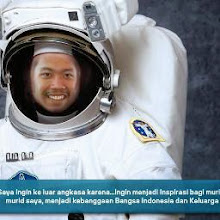~Symmetry, Geometry, and Physics~
Background
- Satoshi Iso (KEK, JAPAN) : Implication of 126 GeV Higgs for Planck scale physics
- Takeo Higuchi (KEK, JAPAN) : New Physics Search at SuperKEKB
- Arief Hermanto (UGM): The Philosophical Analysis of The Structure of Theoretical Physics
- Wispar Sunu Brams Dwandaru (UNY) Non Equilibrium Statistical Mechanics
- Husin Alatas (IPB) Bifurcation of Fluxon at 0-Phi Crossover in Superconductor/Ferromagnet/Superconductor Josephson Junction with External Current
- invited plenary talks
- selected parallel talks
- poster presentations
Penulis dan Ilmuwan Muda bersama para Begawan Fisika Tanah Air.
Dari Kiri ke Kanan:
Mr. Iqbal Robiyana, S.Pd.,
(Pendidikan Fisika, Universitas Pendidikan Indonesia dan Guru di Darul Qur'an International School )
Dr. rer. nat. Muhammad Farchani Rosyid, M.Sc.
(Doctor of Physics, Technical University of Clausthal, Germany)
Mr. Wispar Sunu Brams Dwandaru, M.Sc., Ph.D.,
(Doctor of Science from University of Bristol, UK.)
dan
Mr. Mirza Satriawan, M.Sc., Ph.D.
(Doctor in Theoretical Physics, University of Illinois at Chicago. USA.)
Dari Kiri ke Kanan:
Mr. Iqbal Robiyana, S.Pd.,
(Pendidikan Fisika, Universitas Pendidikan Indonesia dan Guru di Darul Qur'an International School )
Dr. rer. nat. Muhammad Farchani Rosyid, M.Sc.
(Doctor of Physics, Technical University of Clausthal, Germany)
Mr. Wispar Sunu Brams Dwandaru, M.Sc., Ph.D.,
(Doctor of Science from University of Bristol, UK.)
dan
Mr. Mirza Satriawan, M.Sc., Ph.D.
(Doctor in Theoretical Physics, University of Illinois at Chicago. USA.)
Prominent theoretical physicists
Famous theoretical physicists include:
- Galileo Galilei (1564–1642)
- Christiaan Huygens (1629–1695)
- Isaac Newton (1643–1727)
- Leonhard Euler (1707–1783)
- Joseph Louis Lagrange (1736–1813)
- Pierre-Simon Laplace (1749–1827)
- Joseph Fourier (1768–1830)
- Nicolas Léonard Sadi Carnot (1796–1842)
- William Rowan Hamilton (1805–1865)
- Rudolf Clausius (1822–1888)
- James Clerk Maxwell (1831–1879)
- J. Willard Gibbs (1839–1903)
- Ludwig Boltzmann (1844–1906)
- Hendrik A. Lorentz (1853–1928)
- Henri Poincaré (1854–1912)
- Nikola Tesla (1856–1943)
- Max Planck (1858–1947)
- Albert Einstein (1879–1955)
- Milutin Milanković (1879-1958)
- Emmy Noether (1882–1935)
- Max Born (1882–1970)
- Niels Bohr (1885–1962)
- Erwin Schrödinger (1887–1961)
- Louis de Broglie (1892–1987)
- Satyendra Nath Bose (1894–1974)
- Wolfgang Pauli (1900–1958)
- Enrico Fermi (1901–1954)
- Werner Heisenberg (1901–1976)
- Paul Dirac (1902–1984)
- Eugene Wigner (1902–1995)
- Robert Oppenheimer (1904–1967)
- Sin-Itiro Tomonaga (1906–1979)
- Hideki Yukawa (1907–1981)
- John Bardeen (1908–1991)
- Lev Landau (1908–1967)
- Anatoly Vlasov (1908–1975)
- Nikolay Bogolyubov (1909–1992)
- Subrahmanyan Chandrasekhar (1910–1995)
- Richard Feynman (1918–1988)
- Julian Schwinger (1918–1994)
- Feza Gursey (1921–1992)
- Chen Ning Yang (1922– )
- Freeman Dyson (1923– )
- Gunnar Källén (1926–1968)
- Abdus Salam (1926–1996)
- Murray Gell-Mann (1929– )
- Riazuddin (1930– )
- Roger Penrose (1931– )
- George Sudarshan (1931– )
- Sheldon Glashow (1932– )
- Tom W. B. Kibble (1932– )
- Steven Weinberg (1933– )
- Gerald Guralnik (1936–)
- Sidney Coleman (1937–2007)
- C. R. Hagen (1937–)
- Leonard Susskind (1940– )
- Michael Berry (1941– )
- Bertrand Halperin (1941–)
- Stephen Hawking (1942– )
- Alexander Polyakov (1945–)
- Gerardus 't Hooft (1946– )
- Jacob Bekenstein (1947–)
- Robert Laughlin (1950–)
- Edward Witten (1951– )
- Savas Dimopoulos (1952– )
- Lee Smolin (1955- )
- Brian Greene (1963- )
Mainstream theories (sometimes referred to as central theories) are the body of knowledge of both factual and scientific views and possess a usual scientific quality of the tests of repeatability, consistency with existing well-established science and experimentation. There do exist mainstream theories that are generally accepted theories based solely upon their effects explaining a wide variety of data, although the detection, explanation and possible composition are subjects of debate.
Examples
- Black hole thermodynamics
- Classical mechanics
- Condensed matter physics
- Conservation of energy
- Dark Energy
- Dark matter
- Dynamics
- Electromagnetism
- Field theory
- Fluid dynamics
- General relativity
- Molecular modeling
- Particle physics
- Physical cosmology
- Quantum chromodynamics
- Quantum computers
- Quantum electrochemistry
- Quantum electrodynamics
- Quantum field theory
- Quantum information theory
- Quantum mechanics
- Solid mechanics
- Solid state physics or Condensed Matter Physicsand the electronic structure of materials
- Special relativity
- Standard Model
- Statistical mechanics
- Thermodynamics
Proposed theories
The proposed theories of physics are usually relatively new theories which deal with the study of physics which include scientific approaches, means for determining the validity of models and new types of reasoning used to arrive at the theory. However, some proposed theories include theories that have been around for decades and have eluded methods of discovery and testing. Proposed theories can include fringe theories in the process of becoming established (and, sometimes, gaining wider acceptance). Proposed theories usually have not been tested.
Examples
Philosophical Analysis of Theoretical Physics
"Pemahaman Filosofi Bisa Membebaskan Ilmuwan dari Berbagai Praduga yang Membelenggu sehingga dia tidak hanya sekedar menjadi spesialis melainkan benar-benar menjadi seorang pencari kebenaran"
~Alm. Prof. Einstein~
Diadaptasi dari karya Prof. Arief Hermanto, M.Sc., Ph.D., Department of Physics, FMIPA. UGM
Pernyataan dan sikap fisikawan terkenal kadang (atau mungkin bahkan sering) tidak begitu bersahabat terhadap filosofi, seperti misalnya Prof. Steven Weinberg yang menyatakan bahwa kegunaan filosofi bagi fisikawan hanyalah sekedar untuk melindunginya dari prekonsepsi filosof lain atau maksimal hanya sebagai pulasan pemanis bagi sejarah dan penemuan sains.
"The insight of philosophers have occasionally benefited physicists, but generally in a negative fashion- by protecting them from the preconceptions of other philosophers..Philosophy of science at its best seems to me a pleasing gloss on the history and discoveries of science." (Weinberg, 1994)
Akan tetapi sebaliknya para filosof juga tak kalah kerasnya dalam menanggapi sikap fisikawan yg seperti ini, misalnya filosof Biologi Daniel Dennett yang menyatakan bahwa semua sains pasti mengandung filosofi yang sering tidak disadari oleh para saintis.
"There is no such thing as philosophy-free science: there is only science whose philosophical baggage is taken on board without examination. (Dennett, 1996)
Pertentangan seperti di atas tentu saja tak akan bermanfaat bagi semua pihak. Di dalam era kita sekarang ini, di mana hanya KERJA SAMA DARI SEMUA PIHAK akan dapat menelurkan hasil yang besar.
Seperti misalnya yang dinyatakan dalam komentar Prof. Rolf Heuer, Direktur Jendral CERN terhadap penemuan partikel Higgs baru-baru ini.
"Maka sikap yang terbaik bagi kita sebagai fisikawan adalah menghargai khasanah karya keilmuwan para filosof. Kita bisa mempelajarinya dan mengambil bagian mana saja dari karya itu yang bermanfaat bagi fisika.
Bahkan lebih luas luas dari hanya filosofi, fisikawan bisa menimba ilmu dari perbendaharaan ilmu-ilmu humanoria untuk membantu menyelesaikan berbagai masalah dalam fisika, misalnya dalam hal pendidikan fisika."
Penulis dan Ilmuwan Muda Bersama Prof. Satoshi Iso, Ph.D. Ilmuwan dari KEK (Laboratorium Fisika Partikel) dan Alumni University of Tokyo.
Bidang keahlian Profesor yang satu ini adalah:
String Theory and Quantum Field Theory
Semoga pinter dan cerdasnya menular kepada penulis dan yang membacanya Amin.
Semoga pinter dan cerdasnya menular kepada penulis dan yang membacanya Amin.
Ya Allah ya Rabbal Alamin.
Sumber:
Conference on Theoretical Physics and Non Linear Phenomena.
Kota Pelajar dan Budaya.
Ucapan Terima Kasih Kepada:
Sahabat-sahabat Seneby dan Keluarga Forsalim serta kawan-kawan di Jama'ah Salahuddin Masjid Kamus UGM yang sangat ramah serta menyenangkan, mohon maaf telah merepotkan.
Semoga Allah SWT memberikan yang terbaik bagi kita semuanya.
Amin.
at The Train of Thought
Terima Kasih. Kunjungi Juga:
(HIGH ENERGY ACCELERATOR RESEARCH ORGANIZATION)
(Indonesian Theoretical Physicist Group)
(Physics and Mathematics of Nonlinear Phenomena 2013, 22 - 29 June 2013, Gallipoli. Italy)
(Jurusan FISIKA FMIPA UGM)

.jpg)
.jpg)
























